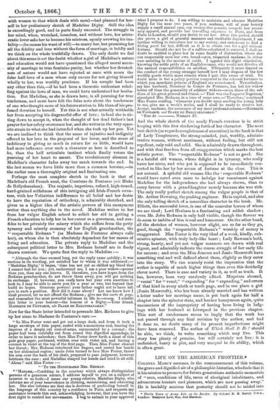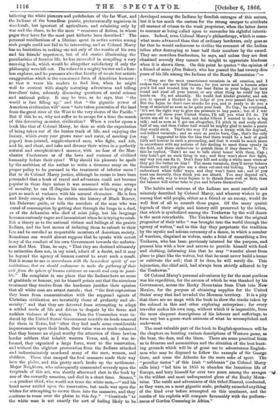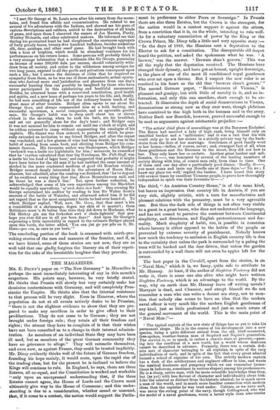LIFE ON THE AMERICAN FRONTIER.*
COLONEL MARCY assumes, in the commencement of this volume, the grave and dignified air of a philosophic historian, who feels that it is his mission to preserve for future generations authentic memorials. of "men, conditions of life, races of aboriginal inhabitants, and adventurous hunters and pioneers, which are now passing away." He is laudably anxious that posterity should not b3 misled into 4' Thirty Years of Army Life on the Border. By Colonel R. B. Marcy, U.S.A. London: Sampson Low, Son, and Marston.
believing the white pioneers and pathfinders of the far West, and the Indians of the boundless prairie, preternaturally sagacious in woodcraft, but ignorant of agriculture, and subsisting only by war and the chase, to be the mere " creatures of fiction, in whose pages they have for the most part hitherto been described." The personal recollections of a lifetime spent in active service among such people could not fail to be interesting, and as Colonel Marcy has no hesitation in making use not only of the results of his own and his friends' experience, but of old stories illustrating the peculiarities of frontier life, he has succeeded in compiling a very amusing book, which would be altogether satisfactory if only the philosophy were left out. The colonel is a mighty hunter and a fear- less explorer, and he possesses also that faculty of comic but artistic exaggeration which is the commonest form of American humour ; so that it vexes his readers to find him, when he might well be content with simply narrating adventures and telling travellers' tales, solemnly discussing questions of social science and national policy. It may be true, as he says, that " the world is fast filling up," and that " the gigantic power of American civilization will" soon " have taken possession of the land from the great river of the West to the very shores of the Pacific." But if this be so, why not suffer us to escape for a time the march of this devouring monster, civilization? When a reader opens a book like that of Colonel Marcy, he does so with the expectation of being taken out of the beaten track of life, and enjoying the luxury, which every year grows rarer and rarer, of meeting (on paper) iron-jointed, supple-sinewed men, who fight, and rob, and lie, and cheat, and take and divorce their wives in a perfectly natural and unsophisticated manner, with no fear of the Man- chester Conference or of the laws and customs of civilized humanity before their eyes? Why should his pleasure be spoilt by the ambition of the author to write a tiresome essay on the proper policy to be pursued in the treatment of inferior races ? But to do Colonel Marcy justice, although he seems to have been persuaded that a book of travel and adventure could not become popular in these days unless it was seasoned with some scraps of morality, he can ill disguise his uneasiness at having to play a part so much at variance with his natural character. He is free and lively enough when he relates the history of Black Beaver, his Delaware guide, or tells the anecdote of the man who was cured of consumption by getting shot through the lungs in a duel, or of the Arkansian who died of mint julep, but his language becomes curiously vague and inconsistent when he is trying to estab- lish a theory as to the national virtues and failings of the prairie Indians, and the best means of inducing them to submit to their fate and be enrolled as respectable members of American society. Sometimes one would almost suppose that he speaks with covert irony of the conduct of his own Government towards the unfortu- nate Red Men. Thus, he says, "That they are destined ultimately to extinction does not, in my mind, admit of a doubt, and it may be beyond the agency of human control to avert such a result. But it seems to me in accordance with the benevolent spirit of our institutions, that we should endeavour to make the pathway of their exit from the sphere of human existence as smooth and easy as possi- ble." He complains in one place that the Indians have no sense of gratitude or honour, yet he himself points .out that the atrocious treatment they receive from the borderers justifies their opinion that all white men are arrant rascals ; that " the first expressions they learn from communication with the supposed agents of Christian civilization are invariably those of profanity and ob- scenity;" and that they are deterred from attempting to adopt a settled mode of life and driven to despair by the fierce and reckless violence of the whites. Thus the Comanches were in- duced by the United States' Government to settle on lands reserved for them in Texas, but " after they had made some considerable improvements upon their lands, their value was so much enhanced that they became an object worthy the attention of those lawless border robbers that inhabit western Texas, and, as I was in- formed, they organized a large force, went to the reservation, an 1 without the slightest provocation from the Indians attacked and indiscriminately murdered many of the men, women, and children. Those that escaped the foul massacre made their way into the plains, and this pretty much broke up the settlement. Major Neighbors, who subsequently commented severely upon the turpitude of this act, was shortly afterward shot in the back by one of the cowardly assassins, and died in a short time. Senaco," —a prudent chief, who would not trust the white men,—" and his band never settled upon the reservation, but made war upon the whites for attempting to coerce them into the massacre, and they continue to roam over the plains to this day." " Gratitude " to the white man is not exactly the sort of feeling likely to be
developed among the Indians by fiendish outrages of this nature, but it is too much the custom for the strong usurper to attribute all manner of crimes to the weak proprietor, when the latter dares to murmur at being called upon to surrender his rightful inherit- ance. Indeed, even Colonel Marcy's philanthropy, which is some- what more advanced than that of ordinary borderers, only goes so far that he would endeavour to civilize the remnant of the Indian tribes after destroying at least half their numbers by the sword. They are merciless freebooters, he says, and unless they are first chastised severely they cannot be taught to appreciate kindness when it is shown'them. On this point he quotes "the opinion of a friend of mine (Jim Baker), who has passed the last twenty-five- years of his life among the Indians of the Rocky Mountains :"— " 'They are the most onsartainest varmints in all creation, and I reckon tha'r not mor'n half human ; for you never seed a human arter you'd fed and treated him to the best fixins in your lodge, jist turn round and steal all your horses, or ary other thing he could lay his hands on. No, not adzackly. He would feel kinder grateful, and ask you to spread a blanket in his lodge ef you ever passed that a-way. But the Injun he don't care shucks for you, and is ready to do you a heap of mischief as soon as he quits your feed. No Cap.,' he continued, ' it's not the right way to give um presents to buy peace ; but ef I war governor of these yeer United States, I'll tell you what I'd do. I'd invite um all to a big feast, and make b'lieve I wanted to have a big talk; and as soon as I got um altogether, I'd pitch in and sculp about half of um, and then t'other half would be mighty glad to make a peace that would stick. That's the way I'd make a treaty with the dog'ond, red-bellied varmints ; and as sure as you're born, Cap., that's the only way.' I suggested to him the idea that there would be a lack of good faith and honour in each a proceeding, and that it would be much more in accordance with my notions of fair dealing to meet them openly in. the field, and there endeavour to punish them if they deserve it. To this he replied, Tain't no use to talk about honor with them, Cap. ; they hain't got no such thing in um; and they won't show fair fight, any way you can fix it. Don't they kill and sculp a white man when-ar they get the better on him? The mean varmint; they'll never behave themselves until you give um a clean out-and-out licking. They can't onderstand white folks' ways, and they won't learn um' and of yon treat um decently, they think you are afeard. You may depend on't, Cap., the only way to treat Injuns is to thrash them well at first, then the balance will sorter take to you and behave themselves."
The habits and customs of the Indians are most carefully and minutely described by Colonel Marcy, and whoever wishes to go. among that wild people, either as a friend or an enemy, would do well first of all to consult these pages. Of the many quaint. legends of their origin and history still preserved by the tribes, that which is symbolized among the Tonkawas by the wolf dance is the most remarkable. The Tonkawas believe that the original progenitor of their tribe " was brought into the world through the agency of wolves," and to this day they perpetuate the tradition. by the mystic and solemn ceremony of a dance, in which a number of warriors, disguised as wolves, make a feint of unearthing a live Tonkawa, who has been previously interred for the purpose, and present him with a bow and arrows to provide himself with food and clothing, informing him that he may "wander about from place to place like the wolves, but that he must never build a house or cultivate the soil ; that if he does, he will surely die. This injunction, the chief said, had always been strictly adhered to by the Tonkawas."
Of Colonel Marcy's personal adventures by far the most perilous was his expedition, for the success of which he was thanked by his Government, across the Rocky Mountains from Utah into New Mexico, for the purpose of obtaining supplies for the United States' army that had invaded the Mormon territory. It is a pity that there are no maps with the book to show the tracks taken by the colonel in this and other exploring enterprises ; for every traveller makes his own map, without which it is impossible, from the most eloquent descriptions of his labours and sufferings, to form any but a guess-work estimate of what he accomplished and underwent.
The most valuable part of the book to English sportsmen will be the chapters on hunting various descriptions of Western game, as the bear, the deer, and the bison. There are some practical hints as to firearms and ammunition and the situation of the best hunt- ing grounds which will be of great use to adventurous English- men who may be disposed to follow the example of Sir George Gore, and cross the Atlantic for the mere sake of sport. The ".peculiar tastes" of this Irish " nobleman" (as Colonel Marcy calls him) "led him in 1855 to abandon the luxurious life of Europe, and bury himself for over two years among the savages -val
in the wildest and most unfrequented glens of the Rocky Moun- tains. The outfit and adventures of this titled Nimrod, conducted,
as they were, on a most gigantic scale, probably exceeded anything of the kind ever before attempted on this continent, and the results of his exploits will compare favourably with the perform- ances of Gordon Cumming in Africa." "I met Sir George at St. Louis soon after his return from the moun- tains, and found him affable and communicative. He related to me several of his adventures with the Indians, and showed me his grins of various dbseriptions and calibres, suited to the destruction of all kinds of game, and upon them I observed the names of Joe Manton, Pardy, Westley Richards, and other celebrated makers. He informed me that during his protracted hunt he had slaughtered the enormous aggregate of forty grizzly bears, twenty-five hundred buffaloes, besides numerous elk, deer, antelope, and other small game. He had brought back with him a host of trophies, which would be abundant vouchers for his performances on his return home. Some persons will probably think it a very strange infatuation that a nobleman like Sir George, possessing an income of some 200,000 dole. per annum, should voluntarily with- draw from all society, and retire to the wilderness among savages for two long years, exposed to all the perils and privations consequent upon such a life ; but I assure the denizens of cities that he required no sympathy from them, as he was one of those enthnsiastic,ardent sports- men who derived more real :satisfaction and pleasure from one day's successful hunting than can possibly be imagined by those who have never participated in this exhilarating and healthful amusement. Besides, he returned home with a renovated constitution, good health and spirits, and a new lease of perhaps ten years to his life, and, finally, he had seen something of life out of the ordinary beaten track of the great mass of other tourists. Bridger often spoke to me about Sir George Gore, and always commended him as a bold, dashing, and successful sportsman, a social companion, and an agreeable gentle- man. Sir George's habit was to sleep until about ten or eleven o'clock in the morning, when he took his bath, ate his breakfast, and set out generally alone for the day's hunt ; and Bridger says it was not unusual for him to remain out until ten o'clock at night, and he seldom returned to camp without augmenting the catalogue of his exploits. His dinner was then ordered, to partake of which he gene- rally extended an invitation to my friend Bridger, and after the repast WAS concluded, and a few glasses of wine had been drunk, he was in the habit of reading from some book, and eliciting from Bridger his com- ments thereon. His favourite author was Shakespeare, which Bridger reckon'd was a leetle too highfalutin for him ;' moreover, he remarked that he 'rayther calculated that thar big Dutchman, Mr. Full-Stuff was a leetle bit too fond of lager beer,' and suggested that probably it might have been better for the old man if he had imbibed the same amount of Alcohol in the more condensed medium of good old Bourbon whisky. Bridger seemed deeply interested in the adventures of Baron Man- chansen, but admitted, after the reading was finished, that he be dogond ef he swallered every thing that thar Baren Mountchawson said, and he thont he was a durn'd liar.' Yet, upon farther reflection, he acknowledged that some of his own experience among the Blackfeet would be equally marvellous, ef writ down in a book.' One evening Sir George entertained his auditor by reading to him Sir Walter Scott's account of tho battle of Waterloo, and afterward asked him if he did not regard that as the most sanguinary battle he had ever heard of. To which Bridger replied, Wall, now, Mr. Gore, that thar must 'a bin a considdible of a skrimmage, dogon my skin ef it mustn't ; them Britishers must 'a fit better thar than they did down to Horleans, whar Old Hickry gin urn the forkedest sort o' chain-lightnin' that pre- Imps you ever did see in all yer born days!' And upon Sir George's expressing a little incredulity in regard to the estimate Bridger placed upon this battle, the latter added, You can jist go yer pile on it, Mr. Gore you can, as sure as yer born."
The concluding portion of the book is crammed with mirth-pro- voking stories of the men and manners of the frontier, and if, as we have hinted, some of these stories are not new, they are so well told that one gladly, forgives the literary sin of their repeti- tion for the sake of the irresistible laughter that they provoke.
































 Previous page
Previous page